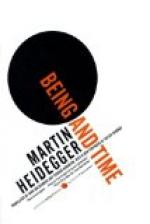|
This section contains 1,687 words (approx. 6 pages at 300 words per page) |

|
[Literary] influences were not absent from Heidegger's early work. But it is only in the mid-1930s, under stress of public events and in the conviction that the language of Sein und Zeit had proved inadequate to its innovative, revolutionary purpose, that Heidegger turned fully to Hölderlin. The four readings of Hölderlin that Heidegger gave in the guise of lectures and essays between 1936 and 1944 make up one of the most disconcerting, spellbinding documents in the history of Western literary and linguistic sensibility. Spoken against a backdrop of deepening barbarism and national self-destruction, these commentaries on a number of Hölderlin's major hymns are nothing less than an endeavor to pierce, via a singular kind of textual and critical exegesis, to the last sanctuary of poetic invention, national identity, and human speech itself. As in the resplendent second chorus of Sophocles' Antigone, of which he has published...
|
This section contains 1,687 words (approx. 6 pages at 300 words per page) |

|


